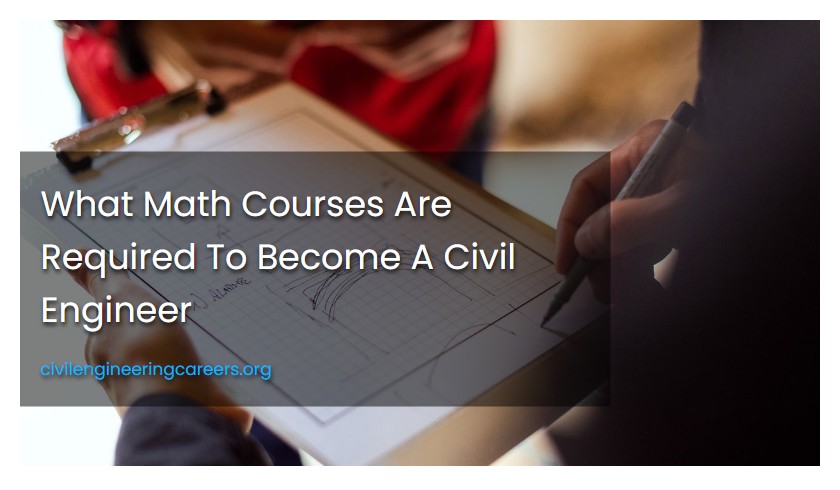What Math Courses Are Required To Become A Civil Engineer

Civil engineering students are expected to have a strong foundation in calculus, including calculus 1, calculus 2, and possibly calculus 3. They should also have an understanding of linear algebra and differential equations. Additionally, proficiency in probability and statistics, as well as applied mathematics, is necessary.
Civil engineering students are expected to have a strong foundation in calculus, including calculus 1 and 2, and often calculus 3. They also typically take courses in linear algebra and differential equations. Knowledge of probability and statistics is also important, as well as the ability to apply mathematics to real-world engineering problems.
Do you need math to be a civil engineer?
Civil engineering requires expertise in complex mathematics, and mastery of math is necessary to become a successful civil engineer.
What are the most challenging math courses to take in civil engineering?
Differential equations is considered the most challenging math course in a civil engineering major due to its abstract and difficult concepts.
What is the curriculum of a bachelor's degree in civil engineering?
The bachelor's degree in civil engineering is a comprehensive curriculum that provides in-depth technical skills and practical knowledge. It prepares candidates for entry-level positions in the field of civil engineering.
Mastering complex mathematics is essential for pursuing a career in civil engineering. Although challenging, it is necessary to complete the core math courses in college, which requires prior completion of introductory college math in high school.
Do civil engineers do math?
Civil engineers use math in their daily work, particularly in physics-related calculations, derived from chemistry equations. While not all their time is spent doing math, they must be proficient in all forms of math relevant to their field.
What degree do I need to be a civil engineer?
To become a civil engineer, you need a bachelor's degree in civil engineering or a related field. Advancement opportunities and senior positions require a graduate degree and licensure.
Do you need math to become an engineer?
Math is a necessary component of becoming an engineer. Regardless of the specific engineering field, some math courses will be required and math theory will be used in future engineering careers.
What makes a good civil engineer?
A good civil engineer should be passionate about developing structures using new materials or techniques that improve on what was built before.
Civil engineering students are expected to have knowledge in calculus, including calculus 1, 2, and possibly calculus 3. They are also required to take courses in linear algebra and differential equations. Additionally, knowledge in probability and statistics and applied mathematics is expected.
What kind of math does a civil engineer use?
A civil engineer uses various forms of math in their job, including algebra, differential equations, statistics, and calculus. They use math frequently in their daily work.
How many levels of calculus do you need to be a civil engineer?
Civil engineering students at college level typically need to complete three to four levels of calculus, which enables them to make physics-related calculations.
What are the majors in civil engineering?
The majors in civil engineering include courses in math, statistics, engineering mechanics and systems, and fluid dynamics, depending on the specialty. The coursework involves a combination of traditional classroom learning, laboratory work, and fieldwork.
What does a civil engineer do?
A civil engineer designs, plans, constructs, and maintains infrastructure projects such as roads, buildings, and bridges. They use math extensively, including differential equations, statistics, calculus, and physics.
Advanced Calculus, Algebra, and Mathematical Physics are considered to be the most difficult math classes. Statistics can also be challenging for some students. It is advisable to seek math help if needed.
Guide to High School Math Classes: Which Do You Need to Take?
AP Calculus BC or IB Math HL are considered the most difficult high school math courses offered, covering challenging and advanced concepts beyond AP Calculus AB.
What math classes should I take?
High school students should take math courses that cover topics such as algebra, functions and equations, trigonometry, vectors, statistics and probability, and calculus. IB math classes are recommended for those majoring in STEM fields.
What are some examples of advanced math classes?
Advanced math classes that demonstrate strong math skills in college admissions include AP Calculus and AP Statistics. These courses are recommended for students interested in STEM fields or who have confidence in their math abilities.
What are the highest levels of mathematics in college?
The highest levels of mathematics in college include graduate courses such as functional analysis and differential geometry, with different branches having their own challenging concepts and complex problems to solve.
CS bachelor's programs typically cover fundamental topics such as computer architecture, programming, data structures, algorithms, and logic and computation. However, there can be variations in focus and specialization offerings due to the broad nature of the CS discipline.
What are the different types of college degrees?
College degrees are categorized into four levels: associate, bachelor's, master's, and doctoral. Each degree level varies in terms of prerequisites, length, and requirements.
What is a bachelor's degree?
A bachelor's degree is an undergraduate academic degree obtained through studying a subject at an academic institution. It can increase job prospects, introduce new ideas, and enhance earning potential.
What can I do with a bachelor's degree in CS?
A bachelor's degree in computer science provides graduates with a broad range of potential career paths in CS and IT. Graduates can become software developers, network architects, computer hardware engineers, and information security analysts. The degree is highly versatile and prepares students for diverse job opportunities.
What degree is best for curriculum and instruction?
Curriculum and instruction degree programs are available for those with or without teaching experience. Individuals with a bachelor's degree in another field can pursue graduate programs in this field. Other options include certificate programs for those who have a master's degree, which can be found online.





